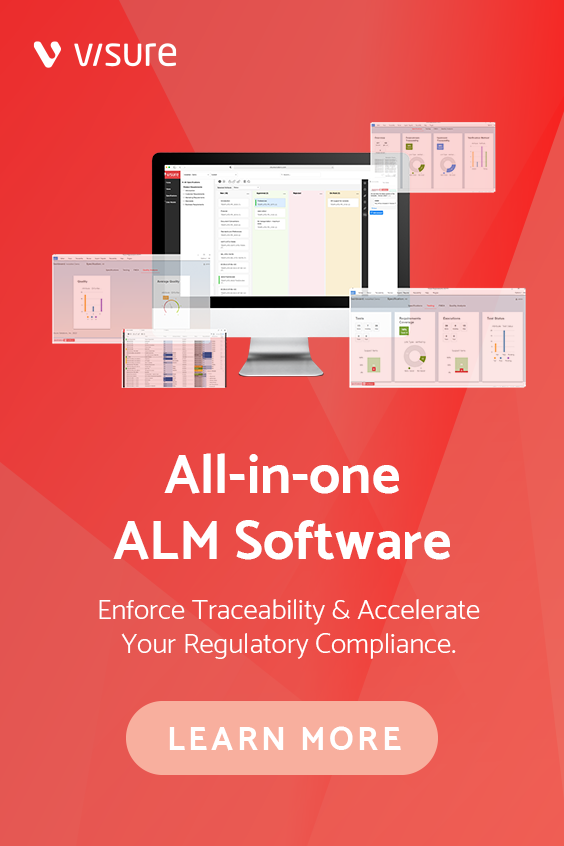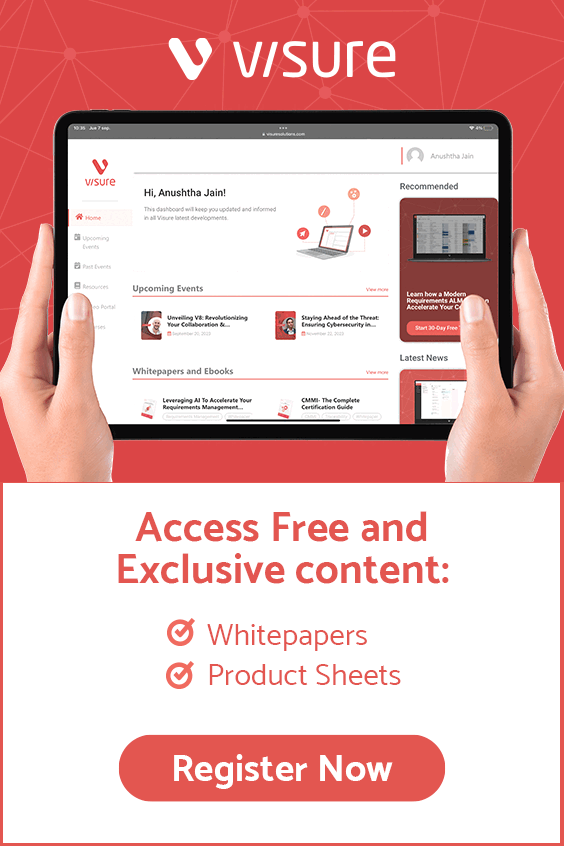Siemens Polarion
Many things can happen during the life of a product: requirements may change, bugs may be discovered, initial assumptions may turn out to be false. To keep the right course and reach the target destination on time and on budget, companies need complete visibility and traceability into the entire product lifecycle, which is where application such as Siemens Polarion or Teamcenter appears to be very useful.
What Is Siemens Teamcenter?
Siemens Teamcenter is a product lifecycle management (PLM) solution for handling all stages of a product’s life.
It helps organizations reduce the manual effort and cost of managing and tracking PLM processes, provides a common sources of bill of materials information across the entire organization, makes it easier for teams to create specifications, analysis repots, 2D/3D illustrations, spreadsheets, test results, and technical publications.
Siemens Teamcenter also brings together mechanical computer-aided design data, multi-domain development, and more from disparate silos, connecting people, systems, and machines using an uninterrupted digital thread.
Siemens Teamcenter can support a single team or an entire large enterprise, it can integrate with ERP and other enterprise applications, and it can reliably protect sensitive information against cybercriminals.
How Siemens Teamcenter Integrates with Polarion?
PLM and ALM tools have evolved addressing different issues, which has created a profound divide between them that is becoming increasingly incompatible with today’s reality and the fact that the demarcation between product development and software development becoming increasingly blurred.
Thanks to its seamless integration with Polarion, Siemens Teamcenter provides a single product ecosystem with integrated product and software requirements management, integrated product and software change management, integrated product and software accountability and traceability, bi-directional associativity between ALM and PLM data and processes, and other important features.
The numerous benefits that come from this integration include improved development productivity, improved product quality and reliability, effective collaboration with traceability of assets, improved cross-discipline visibility of change impact, and streamlined validation of software and product requirements.
What Is Siemens Polarion?
Siemens Polarion is a range of enterprise-grade product development solutions that cover the whole development lifecycle. It removes the need for multiple disjoined tools, which inevitably cause a lot of time and resources to go to waste.
Thanks to its unified approach, Siemens Polarion effectively helps its users cut time to market, improve quality, reduce risks, and enhance productivity.
It comprises of the following products:
- Siemens Polarion ALM: an application lifecycle management solution on a unified, modular, browser-based software environment.
- Siemens Polarion QA: a complete quality assurance and testing solution.
- Siemens Polarion Requirements: a requirements management solution designed from the ground for highly effective, transparent and secure collaboration.
- Siemens Polarion Variants: adds variants management to core Polarion products.
- Siemens Polarion SAFe: Scaled Agile Framework for Polarion.
What Is Siemens Polarion Requirements?
Siemens Requirements, also referred to as Polarion Requirements, is a complete requirements management solution used by over 200 Fortune 1000 companies. It has been available since 2005, gradually maturing to its current state over time by regularly introducing new features and adapting to the changing needs of enterprises.
With Siemens Requirements, it’s easy to enable and support real-time communication between Analysts, Engineers, QA Members, and DevOps Teams thanks to its threaded discussions, wikis, notifications, alerts, and other features.
All data created using Siemens Requirements or imported from other sources can be accessed from a web browser, including historical states of projects. The data can be used to generate comprehensive reports and catch problems earlier in the lifecycle.
Siemens Requirements is a secure requirements management solution with granular permission controls and robust configurable workflow automation. It provides full traceability and automatic change control, ensuring that its users can pass audit, compliance, or regulatory inspection.
What Is Polarion ALM?
Polarion ALM is an application lifecycle management (ALM) solution whose purpose is to help companies release faster and more frequently while maintaining end-to-end traceability and visibility into the entire application lifecycle.
Like most other ALM solutions, Polarion ALM encompasses requirements management, software architecture, computer programming, software testing, software maintenance, change management, continuous integration, project management, and release management.
It is developed by Polarion Software, a software development company founded in 2004 and acquired by Siemens PLM Software in January 2016. Prior to the acquisition, Siemens had been an investor, a partner, and a customer of Polarion.
Siemens Requirements vs Siemens ALM What Are the Differences?
Siemens Requirements is a requirements management solution, while Siemens ALM is an application lifecycle management solution.
As modern enterprises increasingly find themselves orchestrating large, disparate teams when developing complex software applications, they can no longer rely on many different point solutions to manage the application lifecycle.
What they need instead is a comprehensive application management solution like Siemens ALM, which integrates requirements management, build and release management, Agile project management, planning and resource management, audits and ports, issue and risk management, test and quality management, reuse and branch management, and change and configuration management.
Main Features of Polarion ALM
Polarion ALM is a feature-packed application lifecycle management solution that provides teams with the functionality they need to drive product advancement while maintaining compliance throughout the development lifecycle.
- Change and configuration management: Polarion ALM stores all artifacts in version control repositories, bringing accountability to the process of gathering, vetting, and implementing change requests.
- Test and quality management: Providing a central platform for managing all testing activities, Polarion ALM lets users easily create test cases, link them to their corresponding work items, and more.
- Reuse and branch management: With Polarion ALM, it’s possible to save time on managing isolated copies of documents by reusing or branching data for effective sequential, parallel project, or product line development.
- Agile and hybrid project management: Polarion ALM gives its users the freedom to decide how they want to implement modern agile techniques.
- Connectors and extensibility: Thank to its free, open APIs, developers can build custom apps and extensions for Polarion ALM or take advantage of out of the box integrations with popular tools.
- Requirements management: Polarion ALM provides a unified requirements management solution that allows teams to collaborate concurrently and securely on specification documents.
- Audits, metrics, and reports: With detailed analytics and real-time status reports, companies can improve their decision-making and ensure their code meets their standards.
- Issue and risk management: From automatic issue tracking, through requirement quality analysis, to build-in project templates, Polarion ALM gives users everything they need to track all possible and reported failures.
- Planning and resource management: Polarion ALM users can improve utilization and release predictability using live planning and granular time tracking while following any methodology.
- Build and release management: Polarion ALM helps improve collaboration and process automation between Development and Operations by tracking down issues with complete audit trails and speeding up compile and error recovery processes.
These and other features allow Polarion ALM to automate systems engineering, improve quality and safety with guaranteed end-to-end traceability for DO-178C and other standards, utilize smaller teams and deliver quicker results, and provide access to centralized information at the right level of each collaborator, among other things.
Limitations of Polarion ALM
Because Polarion ALM takes advantage of Apache Subversion, a software versioning and revision control system used to maintain current and historical versions of files such as source code, web pages, and documentation, it can become noticeably slower after a few years of usage and storing millions of revisions. There are solutions that can alleviate this problem to a large extent, but they are time-consuming, costly, or difficult to implement.
Being a very complex application lifecycle management solution, the users of Polarion ALM must go through a lot of training before they can confidently use most of its features. The cost of training is often high enough to put Polarion ALM out of the reach of smaller businesses.
Less important limitations of Polarion ALM include the lack of auto-save option, front-end clunkiness, and problems with formatting when copy-pasting in MS Office.
Despite these limitations, Polarion ALM remains one of the best application lifecycle management solutions currently available, but there are many compelling alternatives that offer the same or nearly identical capabilities in a sleeker package and for a lower price.
The Best Alternative to Polarion ALM: Visure Requirements ALM platform
Easily the best alternative to Polarion ALM, Visure Requirements is a comprehensive requirements management tool that ranked first in Best Requirements Management Tools and ALM Tools research by Info-Tech for the second year in a row. Visure Requirements provides a unified ALM integration solution that fits right into existing ALM environments and accommodates different teams and cultures.
Its single web-based integration administration console makes it easy to automate repetitive tasks and eliminate human interface errors and time delays. With Visure Requirements, multiple distributed stakeholders can easily collaborate in a centralized requirements management platform, test case traceability and bugs back to individual requirements, perform an impact analysis with a single click, reuse requirements to save time, and instantly generate requirements traceability matrices, requirements verification, test session summary and coverage analysis reports, and much more.
Besides Polarion ALM, Visure Requirements provides integrations with many other ALM software solutions, including HP ALM, IBM Rational Doors, PTC MKS Integrity, Sparx Enterprise Architect, VersionOne Software, and Perforce Software, just to give a few examples. Visure Requirements can be further extended with custom plugins.
Conclusion
From aerospace and defense to banking and finance to software factories, Visure Requirements has its place in all industries where it’s important to never lose track of requirements. Thanks to its fantastic usability and extensive features, Visure Requirements is a great alternative to Polarion ALM, a comprehensive application lifecycle management solution designed to meet the numerous challenges of modern software development.


